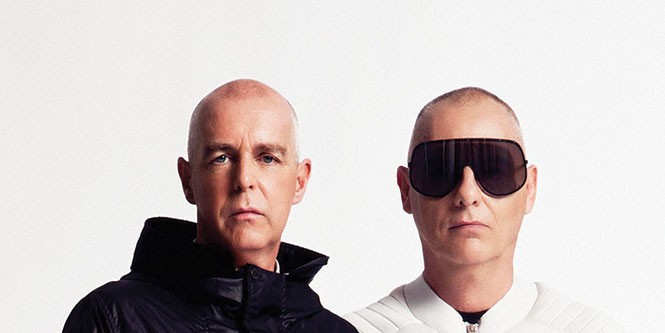

Pet Shop Boys are sometimes dismissed as nothing more than pop pundits, denizens of the dance scene, relics of another age or a combination of all the above. They're certainly no strangers to the charts—"West End Girls," "Go West," "It's a Sin" and a remarkable take on "Always on My Mind" are only a few of the songs that have made them radio staples for the past 35 years. And yet, their scores of other accomplishments have always elevated them far beyond the realm of anything ordinary. With sales of 50 million records, three Brit Awards, six Grammy nominations and the distinction of being the most successful British duo of all time, Neil Tennant (vocals, keyboards) and Chris Lowe (keyboards, vocals)—aren't easily dismissed.
"I like being thought of as a club band and as a pop band," Tennant says. "We are those things. But it's not all we are. There are a lot of different aspects to the Pet Shop Boys. You can like all of them or just one of them. Or maybe two or three of them."
Indeed, one of the band's most distinctive elements is tied to its imagery, from the design of their record sleeves to their stunning live performances. The tour supporting their new album Super (x2/Kobalt), which brings them to Salt Lake City this week, originated as a one-off production at the Royal Opera House in London. Tennant describes it as a modern mesh of film, lasers, lights and music drawn from all phases of their career.
It's a desire to stay creative that still spurs the pair's ambitions. "We always want to do something a bit different," Tennant says. "We love writing songs. For us, that's the fun part of the process. That's something we would do anyway, even if we didn't have a record deal. It's an essential creative outlet for us. Plus, our shows are always changing. We simply try to come up with something that's different and entertaining and sort of exciting."
Of course, like any outfit, they're defined by their music—an interesting mix of original songs and unlikely covers that get a unique and often unexpected turn in their treatment. While Tennant is quick to acknowledge that success, he's also eager to point out that the duo is often typecast in ways that belie the subtleties in their sound.
"People think of us as four-on-the-floor dance music, but it's not all that we are," he says. "It's more sensitive than that. The subject matter is not always typical of pop music. It's often very beautiful and melodic."
After such a long partnership, Tennant and Lowe remain determined to keep moving forward and not allow their past success to overshadow any current efforts. Given the band's past kudos and the high expectations they've inspired in their fans and followers, meeting and exceeding their own high bar can sometimes seem a daunting task. "We always have to rise to the challenge of our own quality control," Tennant says. "If something isn't good enough, it doesn't get released. We have high standards. We've never coasted. We've never been retro. We've never done an '80s tour. We've never stopped writing songs. And we've always embraced opportunities."
Of course, the ability to maintain a partnership through three-and-a-half decades is something of a marvel. There have been the occasional side projects—most notably Electronic, Tennant's one-off collaboration with New Order vocalist Bernard Summer and former Smiths guitarist Johnny Marr—but for the most part, Tennant and Lowe's collaboration has continued unimpeded.
The rarity of such an association isn't lost on Tennant. "Finding someone to write songs and make music with doesn't come along very often. Plus, we enjoy each other's company. We have a similar sense of humor. And when you've been through something that's lasted 35 years, with all its history and absurdities, it gives you reason to laugh and reminisce." Tennant also suspects they're creatures of habit. In 1999, during a tour stop in Wales, poor sales and a nearly bankrupt promoter caused him to do some serious thinking. "I said to Chris, 'Why don't we just knock it on the head?' Chris didn't answer. So I just let it go and never brought it up again," Tennant says.
Their audience—one that now spans several generations—is obviously appreciative. "We attract different types of people to our shows," Tennant says. "In America, we get an '80s retro crowd, as well as those who come to hear an electronica concert. There's also a big gay audience, and those people who want to dance. We think of the Pet Shop Boys as a culture all its own, and when you have a situation like that, people are naturally attracted to it."